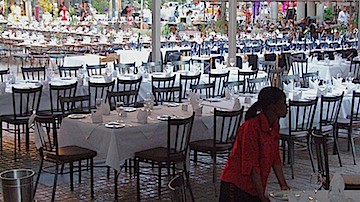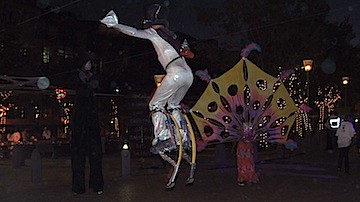12 October 2008
Soweto Architecture

One of the posher parts of Soweto, Diepkloof has schools and quiet streets.
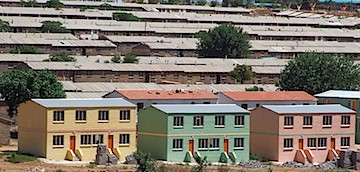
The former men's and women's hostels are being replaced with family accommodation by the municipality.
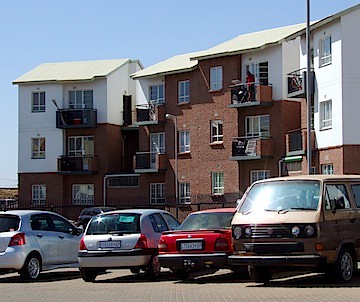
These flats near Freedom Square in Pimville are part of the renovation of Soweto.
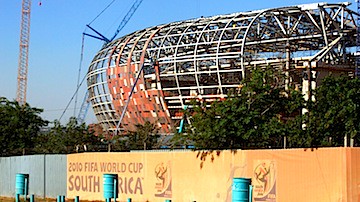
The renovation work for the 2010 World Cup is coming along. Johannesburg is getting 6 stadiums, two of which are in Soweto.

Some people still live without electricity or running water in the shadow of ginormous slag heaps left by the gold mines.
11 October 2008
Maropeng and the Sterkfontein Caves
 Our weekend trip took us to the Cradle of Humanity. I'll let Stuart tell you all about it in his blog:
Our weekend trip took us to the Cradle of Humanity. I'll let Stuart tell you all about it in his blog:
10 October 2008
Three Soweto Entrepreneurs
 George is my first entrepreneur. He is 70 and retired from a job at a bank. He took a course with the Tourism Authority and now drives tourists through his home suburb. Apart from his in-depth knowledge of the area, having lived there since the 70's he also has some interesting stories about life under Apartheid and some pretty definite political views: "I don't give a man food, I give him the means to get his own food."
George is my first entrepreneur. He is 70 and retired from a job at a bank. He took a course with the Tourism Authority and now drives tourists through his home suburb. Apart from his in-depth knowledge of the area, having lived there since the 70's he also has some interesting stories about life under Apartheid and some pretty definite political views: "I don't give a man food, I give him the means to get his own food."
 I met my second entrepreneur (or rather both of them) as we were driving through Pimville, a small part of Southern Soweto. As we were driving along, I saw a large red elephant by the side of the road. It turns out that Lebo and Isaac had collected steel reinforcing rods, wire and red onion bags and were building a life-sized elephant. They had based it on a photo found in a magazine and drawn designs based on this to decide where the steel rods should go to form the base of the elephant. After covering the frame with onion sacks there were going to smooth it with cement to make a realistic-looking animal. These were then for sale. Pretty cool. If you want to buy one for your garden let me know and I'll give you their mobile number.
I met my second entrepreneur (or rather both of them) as we were driving through Pimville, a small part of Southern Soweto. As we were driving along, I saw a large red elephant by the side of the road. It turns out that Lebo and Isaac had collected steel reinforcing rods, wire and red onion bags and were building a life-sized elephant. They had based it on a photo found in a magazine and drawn designs based on this to decide where the steel rods should go to form the base of the elephant. After covering the frame with onion sacks there were going to smooth it with cement to make a realistic-looking animal. These were then for sale. Pretty cool. If you want to buy one for your garden let me know and I'll give you their mobile number.
 I met my third entrepreneur at lunch. A cousin of George's (who seems to know everyone in the neighbourhood) Robby runs a B&B/restaurant/marketing firm. He co-ordinates with the large car companies such as Mercedes, Audi and Lexus to showcase their new models to potential buyers in Soweto. Despite it's large and increasingly well-off population and the building of many shopping malls in the last decade, Soweto still misses out on car showrooms. So Robby fills that gap by putting on a party and drawing in the customers.
I met my third entrepreneur at lunch. A cousin of George's (who seems to know everyone in the neighbourhood) Robby runs a B&B/restaurant/marketing firm. He co-ordinates with the large car companies such as Mercedes, Audi and Lexus to showcase their new models to potential buyers in Soweto. Despite it's large and increasingly well-off population and the building of many shopping malls in the last decade, Soweto still misses out on car showrooms. So Robby fills that gap by putting on a party and drawing in the customers.
09 October 2008
The Constitutional Court
This court has been deciding such important human rights issues as the right of gay people to marry and adopt children; the duty of the government to provide pregnant mothers with retroviral drugs to prevent infection of their babies at birth; abolition of the death penalty... South Africa has the most modern constitution in the World, forbidding discrimination on the grounds of sexual orientation and disability, for example.
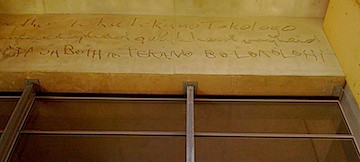
All the justices of the first court inscribed their names into the concrete of the new building.

Nelson Mandela said this about a democratic and free society at the Rivonia treason trial:
"It is an ideal which I hope to live for and achieve. But if need be, it is an ideal for which I am prepared to die."
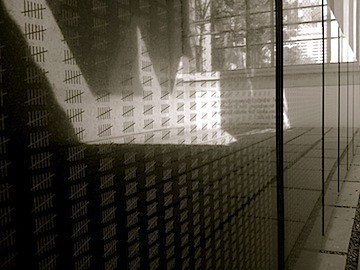
He then proceeded to spend 27 years in prison. The days of his and other political prisoners' incarceration are marked on these slabs.

Each of the articles of the constitution is carved into the front door of the court, in all the official languages of South Africa, as well as Braille and sign language.
More pictures from Constitution Hill

One of the remaining staircases from the Awaiting Trial Block


The inside of the women's prison. Prisoners were not allowed to cross the central space.

Crockery was shared and cleaned once a month

The isolation cells at Number 4, the non-White men's prison
Mapping memory
 One of the projects helping to visualise the reality of the apartheid prison was to run workshops with returning prisoners to elicit their memories and capture the past.
One of the projects helping to visualise the reality of the apartheid prison was to run workshops with returning prisoners to elicit their memories and capture the past.
 Everyday objects became meaningful when viewed through the decriptions of the ex-prisoners. This woman talked about the difficulty of opening cans brought in by visitors.
Everyday objects became meaningful when viewed through the decriptions of the ex-prisoners. This woman talked about the difficulty of opening cans brought in by visitors.  Another spoke of being arrested because she forgot her passbook on the way to buying fish in the market.
Another spoke of being arrested because she forgot her passbook on the way to buying fish in the market.
Constitution Hill
Many Blacks were arrested for violating the pass laws, which required them to carry a registration book stating their entitlement to be in a certain area at a certain time, to carry out certain jobs and to live in specified areas. Between the 1940's and the 80's more than half of all non-White prisoners were pass offenders, or as one of the displays (under)stated: "Without meaning to, it was quite easy to break the law if you were Black".
 A passbook
A passbook
The only building that was completely knocked down to make way for the new court was the so-called Awaiting Trial Block, which once housed famous prisoners such as Nelson Mandela and Mahathma Ghandi. All that is left is a marked outline on the floor and the four staircases reaching up to the blue sky. One of those has been cleverly incorporated into the back of the court chamber, and the bricks gave been recycled to form the wall of the court and the Great African Steps. The design of the court is based on the traditional African concept of justice under a tree, where the chief would receive complaints and discuss matters of state I'm the village square on the shade of a tree. From the lamps to the carpet pattern to the shape of the windows this design is carried through.
Mobile Blogging from here.
08 October 2008
Our new place
 The living space. Behind the location is a large glass table for dining, which goes into the kitchen. Behind the sofa on the left is the main bedroom and bath, where we will install a screen to separate the bedroom from the living room.
The living space. Behind the location is a large glass table for dining, which goes into the kitchen. Behind the sofa on the left is the main bedroom and bath, where we will install a screen to separate the bedroom from the living room.
 Master bedroom. The bathroom is on the left.
Master bedroom. The bathroom is on the left.
 Biiig bath. Stuart happy. Ergo, Fiver happy.
Biiig bath. Stuart happy. Ergo, Fiver happy.
 The pool. Maybe finally I can learn to swim proper lengths.
The block is two minutes walk from Stuart's work, so he is very keen on it. It's located here:
The pool. Maybe finally I can learn to swim proper lengths.
The block is two minutes walk from Stuart's work, so he is very keen on it. It's located here:
View Larger Map
07 October 2008
05 October 2008
Watching wild animals
www.flickr.com
|


